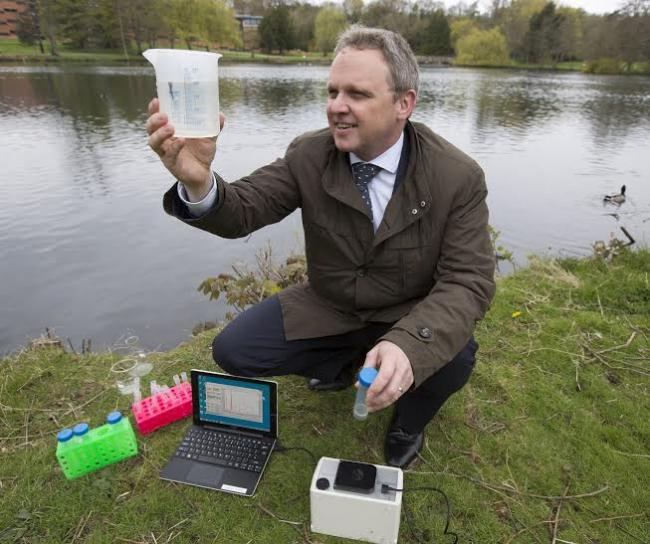November 23, 2024 02:36 (IST)

Birmingham water experts develop device to help save lives in India
Birmingham/New Delhi, May 17 (IBNS): Experts at the University of Birmingham have developed a device that could save lives in India by quickly and simply testing whether water supplies are safe to drink.
A team from the University’s Department of Civil Engineering has developed prototype optical equipment which uses water’s natural fluorescence to ‘scan’ the water and highlight pollutants that are present in the sample – almost instantly revealing whether supplies are safe to drink.
The researchers are now working with experts from Oxfam and funding from the Engineering and Physical Sciences Research Council and the Diageo Foundation to refine the instrument design and make it ideally suited to disaster relief and areas of poor sanitation.
And they plan to work with counterparts at TERI University on research based around the quality of drinking water in New Delhi.
The city is located on the banks of the Yamuna and many inhabitants rely on the river for their daily water supply. Many households in northern Delhi rely on shallow groundwaters, abstracted by hand-pump, for drinking water supply – providing potential for water contamination.
The ‘Duo Fluor’ device uses portable and inexpensive, off-the-shelf equipment to reveal unsafe sources of drinking water in less than 30 seconds. It should help reduce the risk of future widespread outbreaks of cholera and other water-related diseases in areas of poor sanitation.
Professor John Bridgeman led the team of researchers who developed the device. He said: “It is vital to ensure that people have access to safe water supplies. The ‘Duo Fluor’ device is a huge step forward in managing water and wastewater systems and has the potential to save lives – not just in India, but around the globe."
“Microbiological waterborne disease remains a significant concern for the global water community. Pathogens in drinking water sources cause ill health and the ‘Duo Fluor’ allows rapid drinking water quality checks to prevent the spread of disease and death.”
He added that despite the hard work of those responding to the UN Millennium Development Goals, there are still 768 million people who do not have access to safe drinking water supplies and 2.5 billion are without access to improved sanitation services.
Current methods of analysing the quality of drinking water take more than 12 hours and use expensive reagents. This is not fast enough to meet people’s needs in poor communities and disaster zones.
“Duo Fluor allows water experts to interpret results, but also uses user-friendly technology to allow non-experts to test whether water is safe to drink,” said Professor Bridgeman. “This means that people in the poorest communities could help to protect themselves from unsafe drinking water.”
Support Our Journalism
We cannot do without you.. your contribution supports unbiased journalism
IBNS is not driven by any ism- not wokeism, not racism, not skewed secularism, not hyper right-wing or left liberal ideals, nor by any hardline religious beliefs or hyper nationalism. We want to serve you good old objective news, as they are. We do not judge or preach. We let people decide for themselves. We only try to present factual and well-sourced news.
Support objective journalism for a small contribution.
Latest Headlines
Plastics treaty: UN experts call for centrality of human rights Fri, Nov 22 2024
UNICEF report warns children could face eight times more heatwaves in 2050 than in 2000 Wed, Nov 20 2024
Toxic air and smog choke Delhi as experts at COP29 in Baku warn how dragging feet on fossil fuel reduction can cause catastrophe Tue, Nov 19 2024
Elon Musk's SpaceX launches Indian satellite on Falcon 9 rocket Tue, Nov 19 2024
Elon Musk's SpaceX collaborates with ISRO to launch GSAT-20 communications satellite this week Sun, Nov 17 2024
More than 260 million people in USA will be either obese or overweight by 2050: Study Fri, Nov 15 2024
WHO-released study shows global diabetes epidemic reaches critical levels with 800 million cases Fri, Nov 15 2024
ISI Kolkata's Prof Neena Gupta wins Infosys Prize 2024 for her exemplary work in the field of Mathematical Sciences Fri, Nov 15 2024







